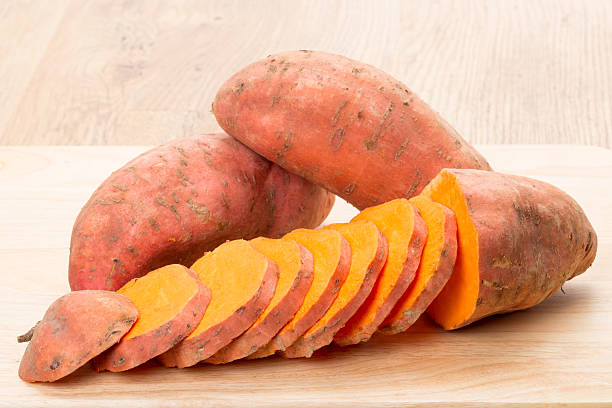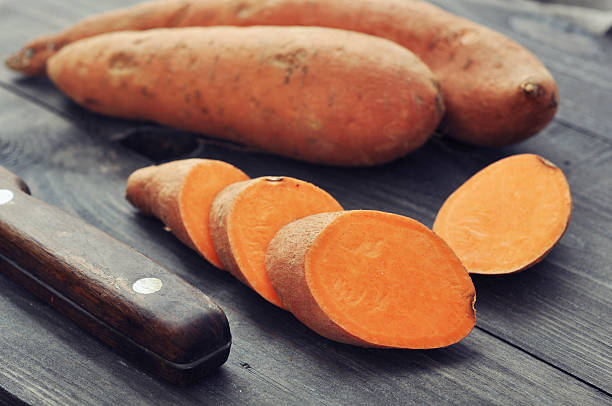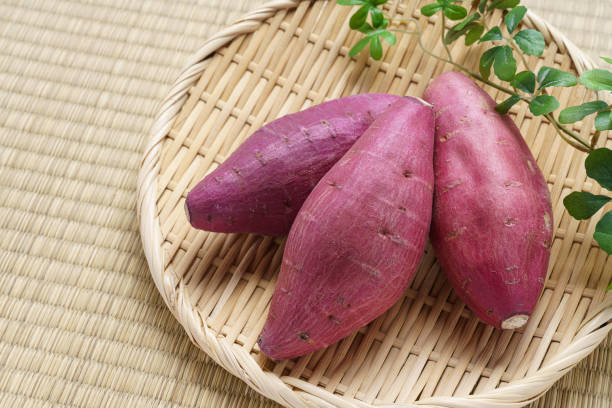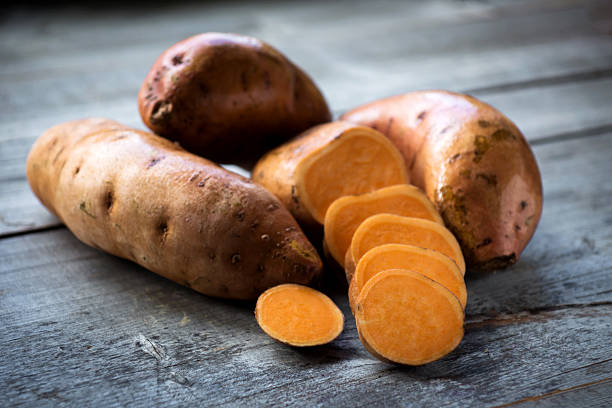Why Sweet Potatoes Are Great for Eye Health
When it comes to protecting your eyesight, sweet potatoes are one of the best foods you can add to your diet. These vibrant root vegetables are loaded with essential nutrients that support vision, including vitamin A, beta-carotene, and powerful antioxidants. Eating them regularly can help reduce the risk of eye conditions like night blindness, dry eyes, and age-related macular degeneration.
Many people think of carrots as the go-to vegetable for eye health, but sweet potatoes offer just as many—if not more—benefits. Their bright orange color comes from their high beta-carotene content, which your body converts into vitamin A. This vitamin is crucial for maintaining clear vision, preventing dryness, and protecting the surface of your eyes.
But the benefits don’t stop there! Sweet potatoes also contain vitamin C and vitamin E, both of which help fight oxidative stress and reduce inflammation that can damage your eyes over time. With so many eye-friendly nutrients packed into every bite, sweet potatoes are a delicious and nutritious way to support long-term eye health.
Let’s explore the many reasons why sweet potatoes should be a regular part of your diet and how they can help keep your vision sharp for years to come.
The Role of Vitamin A in Vision
Vitamin A is essential for maintaining strong and healthy eyesight. This important nutrient supports many aspects of vision, including:
- Preventing night blindness – Vitamin A helps the retina function properly, allowing your eyes to adjust to low light and darkness.
- Keeping the cornea healthy – The cornea, the eye’s outer layer, relies on vitamin A to stay clear and well-lubricated. A deficiency can lead to dryness and irritation.
- Reducing the risk of dry eyes – Vitamin A supports tear production, preventing discomfort and keeping your eyes hydrated.
- Supporting overall vision function – This vitamin plays a key role in protecting eye tissues and reducing the risk of age-related vision problems.
One of the best sources of vitamin A is beta-carotene, a powerful antioxidant found in many orange-colored vegetables—especially sweet potatoes. Your body converts beta-carotene into vitamin A to maintain eye health and prevent deficiencies.
Just one medium-sized sweet potato provides more than 400% of your daily vitamin A needs, making it a delicious and easy way to support your vision. Adding sweet potatoes to your diet can help protect your eyes and keep them functioning at their best for years to come. This makes them one of the best natural sources of this essential vitamin.

How Vitamin A Helps Prevent Night Blindness
Night blindness makes it difficult to see in low-light conditions, such as when driving at night or moving through a dimly lit room. This happens because the eyes struggle to adjust to darkness, making vision blurry or unclear.
Vitamin A plays a key role in preventing night blindness by supporting the retina, the part of the eye responsible for detecting light. It helps form rhodopsin, a pigment in the retina that allows your eyes to adapt to darkness. Without enough vitamin A, rhodopsin production decreases, leading to poor night vision.
Eating vitamin A-rich foods, like sweet potatoes, can help improve your ability to see in low light. These root vegetables are packed with beta-carotene, which the body converts into vitamin A. Including them in your diet regularly can support better night vision and overall eye health, reducing the risk of night blindness as you age.
The Link Between Vitamin A and Dry Eyes
If your eyes often feel dry, irritated, or itchy, a vitamin A deficiency could be the cause. This essential vitamin plays a major role in keeping your eyes hydrated by supporting tear production and maintaining a healthy surface on the eye. Without enough vitamin A, your eyes may struggle to produce enough moisture, leading to discomfort and an increased risk of infections.
One of the easiest ways to prevent dry eyes naturally is by eating more vitamin A-rich foods, such as sweet potatoes. These nutritious root vegetables are packed with beta-carotene, which your body converts into vitamin A. Adding sweet potatoes to your meals can help keep your eyes lubricated, reduce irritation, and support overall eye health.
Beta-Carotene and Its Antioxidant Power
Beta-carotene is a powerful antioxidant that plays a vital role in protecting your eyes from oxidative stress caused by harmful free radicals. These unstable molecules can damage eye cells over time, increasing the risk of vision problems. By including more beta-carotene-rich foods in your diet, you can help shield your eyes from long-term damage and maintain clear vision.
A diet high in beta-carotene may help lower the risk of:
- Age-related macular degeneration (AMD) – A leading cause of vision loss, AMD occurs when the macula, the part of the retina responsible for sharp central vision, deteriorates over time.
- Cataracts – These cloudy areas that form on the eye’s lens can make vision blurry and impact daily activities. Beta-carotene’s antioxidant properties help slow their development.
- Eye inflammation – Chronic inflammation can contribute to eye discomfort and increase the risk of vision issues. Beta-carotene helps reduce inflammation and supports overall eye health.
According to the American Optometric Association, eating a diet rich in beta-carotene can provide long-term eye protection and reduce the chances of developing serious eye conditions. Sweet potatoes are an excellent source of this vision-boosting nutrient, making them a great addition to any eye-healthy diet.
Beta-Carotene and Its Antioxidant Power
Beta-carotene is a powerful antioxidant that plays a vital role in protecting your eyes from oxidative stress caused by harmful free radicals. These unstable molecules can damage eye cells over time, increasing the risk of vision problems. By including more beta-carotene-rich foods in your diet, you can help shield your eyes from long-term damage and maintain clear vision.
A diet high in beta-carotene may help lower the risk of:
- Age-related macular degeneration (AMD) – A leading cause of vision loss, AMD occurs when the macula, the part of the retina responsible for sharp central vision, deteriorates over time.
- Cataracts – These cloudy areas that form on the eye’s lens can make vision blurry and impact daily activities. Beta-carotene’s antioxidant properties help slow their development.
- Eye inflammation – Chronic inflammation can contribute to eye discomfort and increase the risk of vision issues. Beta-carotene helps reduce inflammation and supports overall eye health.
According to the American Optometric Association, eating a diet rich in beta-carotene can provide long-term eye protection and reduce the chances of developing serious eye conditions. Sweet potatoes are an excellent source of this vision-boosting nutrient, making them a great addition to any eye-healthy diet.

Other Eye-Friendly Nutrients in Sweet Potatoes
Beyond vitamin A and beta-carotene, sweet potatoes contain other important nutrients that support eye health:
Vitamin C
This antioxidant helps protect the eyes from damage and lowers the risk of cataracts. Research suggests that people with higher vitamin C intake have a reduced likelihood of developing cataracts as they age.
Vitamin E
Vitamin E works alongside vitamin C to combat oxidative stress, which can contribute to age-related eye conditions. Foods high in vitamin E, such as sweet potatoes, can help maintain healthy cells in the eyes.
Zinc
Zinc plays a key role in transporting vitamin A from the liver to the retina to produce melanin, a protective pigment in the eyes. Without enough zinc, your vision could suffer, leading to poor night vision and increased risk of eye diseases.
Lutein and Zeaxanthin
These carotenoids are found in the retina and help filter harmful blue light, reducing the risk of macular degeneration. Eating foods rich in lutein and zeaxanthin, like sweet potatoes, can help maintain sharp vision over time.
Sweet Potatoes vs. Other Eye-Healthy Foods
While sweet potatoes are a fantastic source of eye-boosting nutrients, they are not the only food that supports vision health. Here’s how they compare:
| Food | Key Nutrients for Eye Health | Benefits |
|---|---|---|
| Sweet Potatoes | Beta-carotene, Vitamin A, C, E, Zinc, Lutein, Zeaxanthin | Supports overall vision, prevents dryness, reduces oxidative stress |
| Carrots | Beta-carotene, Vitamin A | Improves night vision |
| Spinach | Lutein, Zeaxanthin, Vitamin C | Protects against macular degeneration |
| Salmon | Omega-3 fatty acids, Vitamin D | Prevents dry eye syndrome |
| Eggs | Lutein, Zeaxanthin, Vitamin A | Enhances eye function and reduces risk of cataracts |
How to Add More Sweet Potatoes to Your Diet
Incorporating sweet potatoes into your daily meals is easy and delicious. Try these simple ideas:
- Roasted Sweet Potatoes: Drizzle with olive oil and bake for a crispy, nutrient-packed side dish.
- Sweet Potato Mash: Swap regular mashed potatoes for a vitamin-rich alternative.
- Sweet Potato Soup: Blend with carrots, ginger, and coconut milk for a comforting meal.
- Baked Sweet Potato Fries: A healthier alternative to regular fries.
- Smoothies: Add cooked sweet potatoes to smoothies for a creamy texture and extra nutrition.
- Sweet Potato Pancakes: Use mashed sweet potatoes in pancake batter for a nutritious twist on breakfast.
- Stuffed Sweet Potatoes: Fill them with black beans, avocado, and salsa for a delicious meal.

Sweet Potato Myths Debunked
Some people avoid sweet potatoes due to misconceptions about their sugar content or carbohydrate levels. Here’s the truth:
- Myth: Sweet potatoes cause blood sugar spikes.
- Fact: Sweet potatoes have a low glycemic index, meaning they release sugar slowly and help maintain stable blood sugar levels.
- Myth: White potatoes are just as good for eye health.
- Fact: White potatoes lack the high beta-carotene content that makes sweet potatoes so beneficial for vision.
- Myth: Sweet potatoes are only good for side dishes.
- Fact: Sweet potatoes can be used in soups, salads, desserts, and even main courses.
Final Thoughts: Eat Your Way to Better Vision
Sweet potatoes are more than just a delicious side dish—they’re a natural way to support long-term eye health. Packed with vitamin A, beta-carotene, and powerful antioxidants, they help protect against vision loss, reduce the risk of eye conditions, and keep your eyesight sharp and clear.
Adding sweet potatoes to your meals is an easy and tasty way to nourish your eyes from the inside out. Whether baked, mashed, roasted, or blended into soups and smoothies, these nutrient-rich root vegetables can make a big difference in your vision health.
So why not start including more sweet potatoes in your diet today? Your eyes will thank you for it!
Do you have a favorite way to enjoy sweet potatoes? Share your recipes and thoughts in the comments below!

